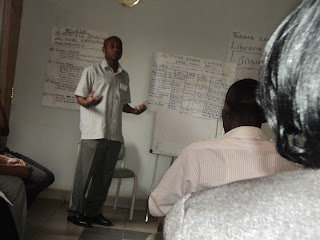 |
| Executive Director for East African Village Libraries giving opening remarks at the conference |
All representatives arrived at Olive Leaf Hotel around 12:00pm.
We were warmly welcome UgCLA coordinator, Madam Musoke Brenda and were served
lunch as we relax from the long journey we had travelled all night long.
The conference commenced at exactly 2:30pm with Oral
literature by the Auther of "ONE LITTLE GUITAR" Kathryn Barrett –Gaines. She distributed that book to each library represented. In her words
regretted the death of her husband late Kafero, the former Ugandan musician and
expressed sincere gratitude to all supporter and funs of Kafero’s songs. She
said that whenever her and her husband would stage a show they would see the
whole place congested with their funs very happy and cheering to the top of
their voices meaning that very many people loved Kafero songs not only in
Uganda but also other countries in the world.
 |
| Kathryn presenting oral literature about her book entitle 'one little Guitar ' |
This motivated her to re write all the songs late kafero had
produced in Luganda language and translated them into English so that even
those people who don’t understand Luganda can be able to understand the
meanings of those songs because his songs very educative.
The next presenter was from Lit World in Nairobi by Mr. Jeffery
and Miss. Prisca. They explain what Lit World is and what they do in general.
They explained that Lit World means Literature World in full, they advocate for
a literate world where their goal is to see everybody living in the world knows how read and write
in any language she/ he understands
They said that in order to achieve that goal, they had to
target children most and then adults. Because children learn faster than adults
and that what you were taught in your child hood is more important than what
you were taught at an old age. They help young children from poor families
ranging from 4- 13 years of age with schoolbooks,
teaches them how to write and read aloud in public or big audience. This builds
their confidence, courage, belonging, friendship, curiosity and hope for the
future. They do all this through creating lit clubs, read aloud clubs and
family read together clubs (parents read with the children).
They argued all libraries to form children and adults
classes at their library to improve the literacy levels in our communities and
the world at large.
On the second day of the conference, the 10 libraries that
won the grant last year for Transforming Community Libraries, phase 1 , reported
on how they have spent their grant and
developments made at their libraries due to grant given to them. Among the
libraries that reported were Busolwe Public Library, Christian Community
Foundation Bududa, Gayaza Family learning Resource Centre and Good Shepherd
Community Library Hoima. In addition, other libraries were not represented and
so they did not report.
The proposal form for Transforming community libraries,
phase 2 were distributed among the library representatives and were guided on
how to make good proposals and proper items to put in the budget.

Another presentation was
about “Libraries for Languages” and was presented by libraries that have done work on producing and using local language materials like Busolwe Community Library and books already produced in local languages were exhibited and explained how they came up with those local Language materials.
about “Libraries for Languages” and was presented by libraries that have done work on producing and using local language materials like Busolwe Community Library and books already produced in local languages were exhibited and explained how they came up with those local Language materials.
 Regional Clusters
were then formed to develop plans for regional workshops and individual library
for producing local language materials.
Regional Clusters
were then formed to develop plans for regional workshops and individual library
for producing local language materials.
As a librarian, I learnt that producing books in local
languages or translating them would give opportunity for community members that
are not able to read English words to begin visiting libraries. In addition,
forming reading clubs for from different categories of readers will improve the
reading culture in the community thus; literacy levels will be improved in the end
 |
| UgCA Staff and Library representatives pouse for a group photo after the conference |
No comments:
Post a Comment